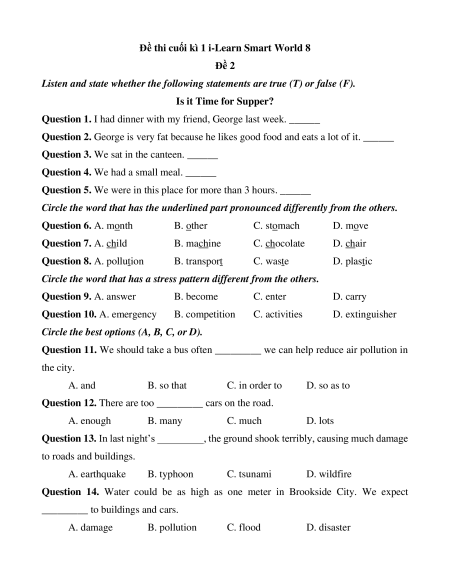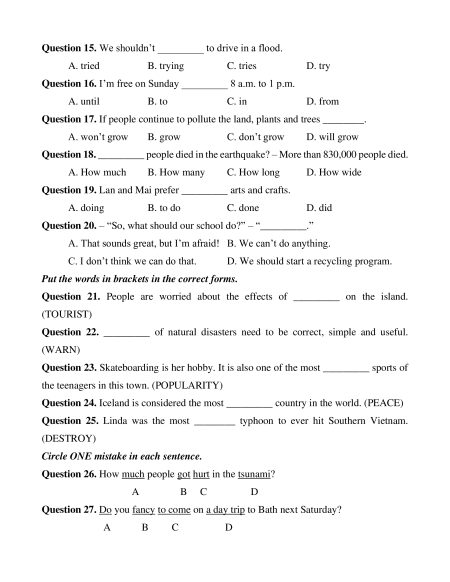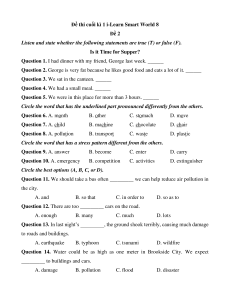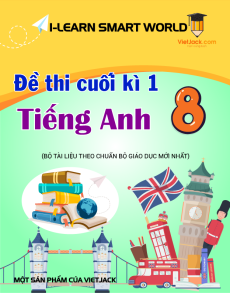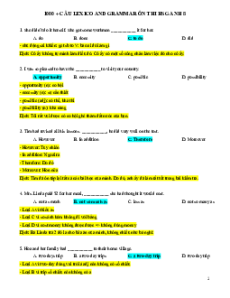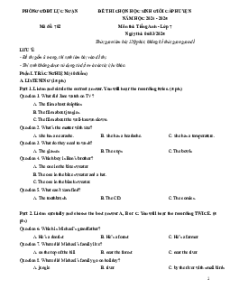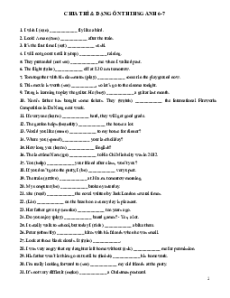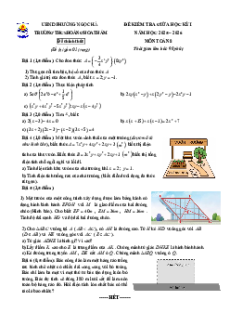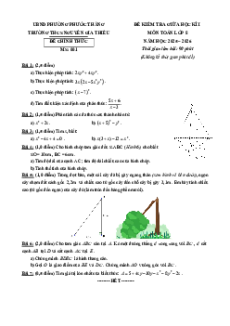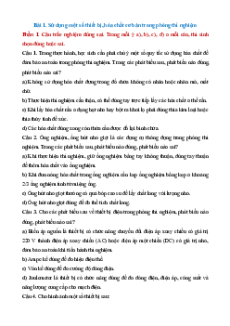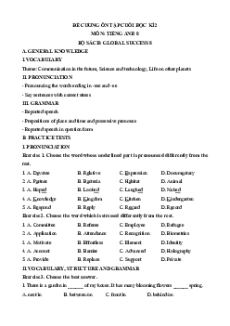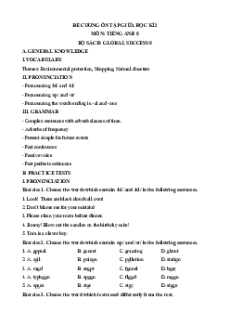Đề thi cuối kì 1 i-Learn Smart World 8 Đề 2
Listen and state whether the following statements are true (T) or false (F). Is it Time for Supper?
Question 1. I had dinner with my friend, George last week. ______
Question 2. George is very fat because he likes good food and eats a lot of it. ______
Question 3. We sat in the canteen. ______
Question 4. We had a small meal. ______
Question 5. We were in this place for more than 3 hours. ______
Circle the word that has the underlined part pronounced differently from the others. Question 6. A. month B. other C. stomach D. move Question 7. A. child B. machine C. chocolate D. chair
Question 8. A. pollution B. transport C. waste D. plastic
Circle the word that has a stress pattern different from the others. Question 9. A. answer B. become C. enter D. carry
Question 10. A. emergency B. competition C. activities D. extinguisher
Circle the best options (A, B, C, or D).
Question 11. We should take a bus often _________ we can help reduce air pollution in the city. A. and B. so that C. in order to D. so as to
Question 12. There are too _________ cars on the road. A. enough B. many C. much D. lots
Question 13. In last night’s _________, the ground shook terribly, causing much damage to roads and buildings. A. earthquake B. typhoon C. tsunami D. wildfire
Question 14. Water could be as high as one meter in Brookside City. We expect
_________ to buildings and cars. A. damage B. pollution C. flood D. disaster
Question 15. We shouldn’t _________ to drive in a flood. A. tried B. trying C. tries D. try
Question 16. I’m free on Sunday _________ 8 a.m. to 1 p.m. A. until B. to C. in D. from
Question 17. If people continue to pollute the land, plants and trees ________. A. won’t grow B. grow C. don’t grow D. will grow
Question 18. _________ people died in the earthquake? – More than 830,000 people died. A. How much B. How many C. How long D. How wide
Question 19. Lan and Mai prefer _________ arts and crafts. A. doing B. to do C. done D. did
Question 20. – “So, what should our school do?” – “_________.”
A. That sounds great, but I’m afraid! B. We can’t do anything.
C. I don’t think we can do that.
D. We should start a recycling program.
Put the words in brackets in the correct forms.
Question 21. People are worried about the effects of _________ on the island. (TOURIST)
Question 22. _________ of natural disasters need to be correct, simple and useful. (WARN)
Question 23. Skateboarding is her hobby. It is also one of the most _________ sports of
the teenagers in this town. (POPULARITY)
Question 24. Iceland is considered the most _________ country in the world. (PEACE)
Question 25. Linda was the most ________ typhoon to ever hit Southern Vietnam. (DESTROY)
Circle ONE mistake in each sentence.
Question 26. How much people got hurt in the tsunami? A B C D
Question 27. Do you fancy to come on a day trip to Bath next Saturday? A B C D
Question 28. There isn’t too many entertainment in my hometown. A B C D
Question 29. Unemployment is a major cause poverty. A B C D
Question 30. Stay inside a building when it is on fire. A B C D
Choose the word or phrase that is CLOSEST in meaning to the underlined part in each
of the following sentences.
Question 31. He is hooked on football so much that he goes to every match of his favorite team.
A. is interested in B. is fed up with C. is tired of D. is in favour of
Question 32. Volunteers have given out food and blankets to homeless people in the flooded area. A. properties B. aid C. helping D. technology
Choose the word or phrase that is OPPOSITE in meaning to the underlined part in
each of the following sentences.
Question 33. She’s a sociable child who loves to talk to anyone. A. outgoing B. anti-social C. talkative D. unfriendly
Question 34. Two years ago, the reduction in water and noise pollution in this city was dramatic. A. impressive B. normal C. marketed D. traditional
Read the text about air pollution. Choose the best options.
Air pollution is a big problem in big cities. Evidence shows that air pollution may
cause serious health problems for humans and animals. We (35) _________ more health
problems if we do not lower the air pollution levels. There are some simple actions we
can take to reduce air pollution.
First, get familiar with bus or train routes in your city (36) _________ start to
replace your motorbike travel with a bus trip at least once a week. The frequent use of
public transportation can help reduce emissions that cause air pollution. You can even
walk or bike (37) _________ short distances.
Second, try to use less packaging. Factories can badly (38) _________ air quality
when producing plastic, foil and cardboard for packaging. Whatever you are shopping for,
remember to choose items with as little packaging as possible. If you have no choice, go for recyclable packaging.
Another good way to reduce air pollution is to manage your household waste.
Reusing, recycling and composting can help reduce a significant (39) _________ of
garbage. That means that less garbage will end up in landfills which are major sources of air pollution. Question 35. A. gets B. getting C. will get D. won’t get Question 36. A. but B. for C. yet D. and Question 37. A. in B. for C. with D. at Question 38. A. drop B. grow C. affect D. keep Question 39. A. amount B. number C. total D. level
Read the blog. Write T (True), F (False), or NG (Not Given) if the information is not in the text.
Most of the time, I write about blizzards, typhoons, floods, and so on. But I don’t
ski in a blizzard or get wet in a flood. Well, this week’s blog is different, because this time
I was there when something big happened!
I was on holiday in an area which has earthquakes. I knew that before I went. But
the last big earthquake there happened 50 years ago, so I didn’t really think about it when I booked.
During the first few days, I went swimming every morning in the warm sea and
then, in the afternoon, I walked up the side of the mountain behind the town. I didn’t climb
over rocks or anything like that. I just walked slowly up a few hundred meters of one of the old donkey tracks.
Đề thi cuối kì 1 Tiếng Anh 8 ilearn smart world (Đề 2 kèm file nghe)
1.1 K
544 lượt tải
MUA NGAY ĐỂ XEM TOÀN BỘ TÀI LIỆU
CÁCH MUA:
- B1: Gửi phí vào TK:
1133836868- CT TNHH DAU TU VA DV GD VIETJACK - Ngân hàng MB (QR) - B2: Nhắn tin tới Zalo VietJack Official ( nhấn vào đây ) để xác nhận thanh toán và tải tài liệu - giáo án
Liên hệ ngay Hotline hỗ trợ: 084 283 45 85
Đề thi được cập nhật liên tục trong gói này từ nay đến hết tháng 3/2024. Chúng tôi đảm bảo đủ số lượng đề đã cam kết hoặc có thể nhiều hơn, tất cả có BẢN WORD, LỜI GIẢI CHI TIẾT và tải về dễ dàng.
Để tải tài liệu gốc về máy bạn click vào nút Tải Xuống ở trên!
Thuộc bộ (mua theo bộ để tiết kiệm hơn):
- Tailieugiaovien.com.vn giới thiệu bộ đề thi cuối kì 1 kèm file nghe Tiếng anh 8 ilearn smart world mới nhất nhằm giúp Giáo viên có thêm tài liệu tham khảo ra đề thi Tiếng anh lớp 8.
- File word có lời giải chi tiết 100%.
- Mua trọn bộ sẽ tiết kiệm hơn tải lẻ 50%.
Đánh giá
4.6 / 5(1088 )5
4
3
2
1
Trọng Bình
Tài liệu hay
Giúp ích cho tôi rất nhiều
Duy Trần
Tài liệu chuẩn
Rất thích tài liệu bên VJ soạn (bám sát chương trình dạy)
TÀI LIỆU BỘ BÁN CHẠY MÔN Tiếng Anh
Xem thêmTÀI LIỆU BỘ BÁN CHẠY Lớp 8
Xem thêmTài liệu bộ mới nhất

Đề thi cuối kì 1 i-Learn Smart World 8
Đề 2
Listen and state whether the following statements are true (T) or false (F).
Is it Time for Supper?
Question 1. I had dinner with my friend, George last week. ______
Question 2. George is very fat because he likes good food and eats a lot of it. ______
Question 3. We sat in the canteen. ______
Question 4. We had a small meal. ______
Question 5. We were in this place for more than 3 hours. ______
Circle the word that has the underlined part pronounced differently from the others.
Question 6. A. month B. other C. stomach D. move
Question 7. A. child B. machine C. chocolate D. chair
Question 8. A. pollution B. transport C. waste D. plastic
Circle the word that has a stress pattern different from the others.
Question 9. A. answer B. become C. enter D. carry
Question 10. A. emergency B. competition C. activities D. extinguisher
Circle the best options (A, B, C, or D).
Question 11. We should take a bus often _________ we can help reduce air pollution in
the city.
A. and B. so that C. in order to D. so as to
Question 12. There are too _________ cars on the road.
A. enough B. many C. much D. lots
Question 13. In last night’s _________, the ground shook terribly, causing much damage
to roads and buildings.
A. earthquake B. typhoon C. tsunami D. wildfire
Question 14. Water could be as high as one meter in Brookside City. We expect
_________ to buildings and cars.
A. damage B. pollution C. flood D. disaster

Question 15. We shouldn’t _________ to drive in a flood.
A. tried B. trying C. tries D. try
Question 16. I’m free on Sunday _________ 8 a.m. to 1 p.m.
A. until B. to C. in D. from
Question 17. If people continue to pollute the land, plants and trees ________.
A. won’t grow B. grow C. don’t grow D. will grow
Question 18. _________ people died in the earthquake? – More than 830,000 people died.
A. How much B. How many C. How long D. How wide
Question 19. Lan and Mai prefer _________ arts and crafts.
A. doing B. to do C. done D. did
Question 20. – “So, what should our school do?” – “_________.”
A. That sounds great, but I’m afraid! B. We can’t do anything.
C. I don’t think we can do that. D. We should start a recycling program.
Put the words in brackets in the correct forms.
Question 21. People are worried about the effects of _________ on the island.
(TOURIST)
Question 22. _________ of natural disasters need to be correct, simple and useful.
(WARN)
Question 23. Skateboarding is her hobby. It is also one of the most _________ sports of
the teenagers in this town. (POPULARITY)
Question 24. Iceland is considered the most _________ country in the world. (PEACE)
Question 25. Linda was the most ________ typhoon to ever hit Southern Vietnam.
(DESTROY)
Circle ONE mistake in each sentence.
Question 26. How much people got hurt in the tsunami?
A B C D
Question 27. Do you fancy to come on a day trip to Bath next Saturday?
A B C D

Question 28. There isn’t too many entertainment in my hometown.
A B C D
Question 29. Unemployment is a major cause poverty.
A B C D
Question 30. Stay inside a building when it is on fire.
A B C D
Choose the word or phrase that is CLOSEST in meaning to the underlined part in each
of the following sentences.
Question 31. He is hooked on football so much that he goes to every match of his favorite
team.
A. is interested in B. is fed up with C. is tired of D. is in favour of
Question 32. Volunteers have given out food and blankets to homeless people in the
flooded area.
A. properties B. aid C. helping D. technology
Choose the word or phrase that is OPPOSITE in meaning to the underlined part in
each of the following sentences.
Question 33. She’s a sociable child who loves to talk to anyone.
A. outgoing B. anti-social C. talkative D. unfriendly
Question 34. Two years ago, the reduction in water and noise pollution in this city was
dramatic.
A. impressive B. normal C. marketed D. traditional
Read the text about air pollution. Choose the best options.
Air pollution is a big problem in big cities. Evidence shows that air pollution may
cause serious health problems for humans and animals. We (35) _________ more health
problems if we do not lower the air pollution levels. There are some simple actions we
can take to reduce air pollution.
First, get familiar with bus or train routes in your city (36) _________ start to
replace your motorbike travel with a bus trip at least once a week. The frequent use of
public transportation can help reduce emissions that cause air pollution. You can even
walk or bike (37) _________ short distances.
Second, try to use less packaging. Factories can badly (38) _________ air quality
when producing plastic, foil and cardboard for packaging. Whatever you are shopping for,
remember to choose items with as little packaging as possible. If you have no choice, go
for recyclable packaging.
Another good way to reduce air pollution is to manage your household waste.
Reusing, recycling and composting can help reduce a significant (39) _________ of
garbage. That means that less garbage will end up in landfills which are major sources of
air pollution.
Question 35. A. gets B. getting C. will get D. won’t get
Question 36. A. but B. for C. yet D. and
Question 37. A. in B. for C. with D. at
Question 38. A. drop B. grow C. affect D. keep
Question 39. A. amount B. number C. total D. level
Read the blog. Write T (True), F (False), or NG (Not Given) if the information is not in
the text.
Most of the time, I write about blizzards, typhoons, floods, and so on. But I don’t
ski in a blizzard or get wet in a flood. Well, this week’s blog is different, because this time
I was there when something big happened!
I was on holiday in an area which has earthquakes. I knew that before I went. But
the last big earthquake there happened 50 years ago, so I didn’t really think about it when
I booked.
During the first few days, I went swimming every morning in the warm sea and
then, in the afternoon, I walked up the side of the mountain behind the town. I didn’t climb
over rocks or anything like that. I just walked slowly up a few hundred meters of one of
the old donkey tracks.

On the afternoon of the fifth day, I was on the mountain when the ground started to
move. I remembered about the earthquakes then, and I thought, ‘The ground will open up
and I’ll fall in.’ Then I looked down at the town and saw a huge wave coming very fast
towards it. Houses near the beach disappeared under the water. I was safe on the side of
the mountain, but my hotel fell down and I lost all my stuff.
Question 40. The writer’s blog is usually about bad weather.
Question 41. The writer thought there might be an earthquake while he was there on
holiday.
Question 42. One of the donkey tracks went to the top of the mountain.
Question 43. The writer fell into a hole during the earthquake.
Question 44. The writer watched as the tsunami hit the town.
Complete these sentences.
Question 45. What leisure activity do you like most?
→ What’s _____________________________________________________?
Question 46. Tet is the most important festival in Viet Nam. Most Vietnamese return
home for Tet. (THEREFORE)
→ ___________________________________________________________.
Question 47. Hurricane Dorian is currently hurtling towards Florida. (Make a question
for the underlined part.)
→ ___________________________________________________________?
Reorder the words to make full sentences.
Question 48. be/ with/ people/ Homeless/ will/ temporary/ provided/ accommodation/ .
→ ___________________________________________________________.
Question 49. much/ cities/ lights/ use/ Too/ of/ cause/ in/ may/ light pollution/ electric/ .
→ ___________________________________________________________.
Question 50. interested in/ I/ fishing/ cold/ am not/ weather./ in/ this
→ ___________________________________________________________.

ĐÁP ÁN VÀ LỜI GIẢI:
Listen and state whether the following statements are true (T) or false (F).
Question 1.
Hướng dẫn giải:
Đáp án đúng: F
Thông tin: Last week I went out to have lunch with my friend, George. (Tuần trước tôi ra
ngoài để ăn trưa với bạn tôi, George.)
Dịch: Tôi ăn tối với bạn tôi, George vào tuần trước.
Question 2.
Hướng dẫn giải:
Đáp án đúng: T
Thông tin: George is very fat. He likes good food and eats a lot of it. (George rất béo. Anh
ấy thích đồ ăn ngon và ăn rất nhiều.)
Dịch: George rất béo bởi vì anh ấy thích đồ ăn ngon và ăn rất nhiều.
Question 3.
Hướng dẫn giải:
Đáp án đúng: F
Thông tin: We sat at a big table in the restaurant. (Chúng tôi ngồi ở một cái bàn lớn ở nhà
hàng.)
Dịch: Chúng tôi đã ngồi ở căng tin.
Question 4.
Hướng dẫn giải:
Đáp án đúng: F
Thông tin: After a big meal we had some cakes and drank a few cups of coffee. (Sau một
bữa ăn lớn chúng tôi ăn vài chiếc bánh và uống vài cốc cà phê.)
Dịch: Chúng tôi đã ăn một bữa ăn nhẹ.
Question 5.
Hướng dẫn giải:
Đáp án đúng: T
Thông tin: “We must go now, George” I said. “We have been here for more than three
hours. It’s four thirty”. (“Chúng ta phải đi thôi, George” Tôi nói. “Chúng ta đã ở đây hơn
3 tiếng rồi. Bây giờ là 4 giờ 50 phút.”)
Dịch: Chúng tôi đã ở nơi này hơn 3 tiếng đồng hồ.
Nội dung bài nghe:
Is it time for supper?
Last week I went out to have lunch with my friend, George. George is very fat. He likes
good food and eats a lot of it. We sat at a big table in the restaurant. After a big meal we
had some cakes and drank a few cups of coffee. “We must go now, George” I said. “We
have been here for more than three hours. It’s four thirty”. “What do you mean?” asked
George in surprise. “We can’t leave now. It’s nearly time for supper.”
Dịch bài nghe:
Đến giờ ăn tối rồi sao?
Tuần trước tôi ra ngoài để ăn trưa với bạn tôi, George. George rất béo. Anh ấy thích đồ ăn
ngon và ăn rất nhiều. Chúng tôi ngồi ở một cái bàn lớn ở nhà hàng. Sau một bữa ăn lớn
chúng tôi ăn vài chiếc bánh và uống vài cốc cà phê. “Chúng ta phải đi thôi, George” Tôi
nói. “Chúng ta đã ở đây hơn 3 tiếng rồi. Bây giờ là 4 giờ 50 phút.” “Ý bạn là sao?” George
hỏi trong sự ngạc nhiên. “Chúng ta không thể rời đi lúc này. Sắp đến giờ ăn tối rồi.”
Circle the word that has the underlined part pronounced differently from the others.
Question 6.
Hướng dẫn giải:
Đáp án đúng: D
Đáp án D có phần gạch chân được đọc là /u:/, các đáp án còn lại phần gạch chân được đọc
là /ʌ/.
Question 7.
Hướng dẫn giải:
Đáp án đúng: B
Đáp án B có phần gạch chân được đọc là /ʃ/, các đáp án còn lại phần gạch chân được đọc
là /tʃ/.
Question 8.
Hướng dẫn giải:
Đáp án đúng: A
Đáp án A có phần gạch chân được đọc là /ʃ/, các đáp án còn lại phần gạch chân được đọc
là /t/.
Circle the word that has a stress pattern different from the others.
Question 9.
Hướng dẫn giải:
Đáp án đúng: B
Đáp án B có trọng âm rơi vào âm tiết thứ 2, các đáp án còn lại trọng âm rơi vào âm tiết
thứ 1.
Question 10.
Hướng dẫn giải:
Đáp án đúng: B
Đáp án B có trọng âm rơi vào âm tiết thứ 3, các đáp án còn lại trọng âm rơi vào âm tiết
thứ 2.
Circle the best options (A, B, C, or D).
Question 11.
Hướng dẫn giải:
Đáp án đúng: B
so that + clause = in order to + V-inf = so as to + V-inf: để…
and: và
Dịch: Chúng ta nên bắt xe buýt thường xuyên để giúp giảm ô nhiễm không khí trong thành
phố.
Question 12.
Hướng dẫn giải:
Đáp án đúng: B
too many + N đếm được số nhiều: quá nhiều
too much + N không đếm được: quá nhiều
enough + N: đủ
lots of + N đếm được số nhiều/ không đếm được: nhiều
Dịch: Có quá nhiều xe hơi trên đường.
Question 13.
Hướng dẫn giải:
Đáp án đúng: A
earthquake (n): động đất
typhoon (n): bão nhiệt đới
tsunami (n): sóng thần
wildfire (n): cháy rừng
Dịch: Trong trận động đất tối qua, mặt đất rung chuyển dữ dội, gây ra nhiều thiệt hại cho
đường xá và các tòa nhà.
Question 14.
Hướng dẫn giải:
Đáp án đúng: A
damage (n): thiệt hại
pollution (n): ô nhiễm
flood (n): lũ lụt
disaster (n): thiên tai
Dịch: Nước có thể cao tới một mét ở Thành phố Brookside. Chúng tôi dự kiến sẽ có thiệt
hại cho các tòa nhà và xe hơi.
Question 15.
Hướng dẫn giải:
Đáp án đúng: D
shouldn’t do sth: không nên làm gì
Dịch: Chúng ta không nên cố lái xe trong lũ lụt.
Question 16.
Hướng dẫn giải:
Đáp án đúng: D
from…to…: từ…đến…
Dịch: Tôi rảnh vào chủ nhật từ 8 giờ sang đến 1 giờ chiều.
Question 17.
Hướng dẫn giải:
Đáp án đúng: A
Câu điều kiện loại 1 (có thật ở hiện tại): If + S + V (HTĐ) + O, S + will/can + V-inf + O.
Dịch: Nếu mọi người tiếp tục làm ô nhiễm đất đai, thực vật và cây cối sẽ không phát triển
được.
Question 18.
Hướng dẫn giải:
Đáp án đúng: B
How many + N số nhiều: Có bao nhiêu…
How much + N không đếm được: Có bao nhiêu…
How long: Bao lâu
How wide: Rộng bao nhiêu
Dịch: Có bao nhiêu người thiệt mạng trong trận động đất? – Hơn 830.000 người đã thiệt
mạng.
Question 19.
Hướng dẫn giải:
Đáp án đúng: B
prefer to do sth: thích làm gì hơn
Dịch: Lan và Peter thích làm nghệ thuật và hàng thủ công hơn.
Question 20.
Hướng dẫn giải:
Đáp án đúng: D
A. Điều đó nghe thật tuyệt, nhưng tôi e là vậy!
B. Chúng ta không thể làm gì cả.
C. Tôi không nghĩ chúng ta có thể làm điều đó.
D. Chúng ta nên phát động 1 chương trình tái chế.
Dịch: - “Vậy trường chúng ta nên làm gì?” – “Chúng ta nên phát động 1 chương trình tái
chế.”
Put the words in brackets in the correct forms.
Question 21.
Hướng dẫn giải:
Đáp án đúng: tourism
Sau giới từ “of” cần 1 danh từ.
tourist (n): khách du lịch → tourism (n): du lịch
Dịch: Mọi người lo lắng về những ảnh hưởng của du lịch lên hòn đảo.
Question 22.
Hướng dẫn giải:
Đáp án đúng: warnings
N1 of N2 → Cần 1 danh từ.
Động từ “need” chia số nhiều nên ở đây chủ ngữ phải số nhiều.
warn (v): cảnh báo → warnings (n): các cảnh báo
Dịch: Các cảnh báo thiên tai cần chính xác, đơn giản và hữu ích.
Question 23.
Hướng dẫn giải:
Đáp án đúng: popular
So sánh nhất với tính từ dài: the most + adj dài
popularity (n): tính phổ biến → popular (adj): phổ biến
Dịch: Trượt ván là sở thích của cô ấy. Nó cũng là một trong những môn thể thao phổ biến
nhất của thanh thiếu niên ở thị trấn này.
Question 24.
Hướng dẫn giải:
Đáp án đúng: peaceful
So sánh nhất với tính từ dài: the most + adj dài
peace (n): sự yên bình → peaceful (adj): yên bình
Dịch: Iceland được xem là quốc gia yên bình nhất trên thế giới.
Question 25.
Hướng dẫn giải:
Đáp án đúng: destructive
So sánh nhất với tính từ dài: the most + adj dài
destroy (v): phá hủy → destructive (adj): tàn phá, phá hoại
Dịch: Linda là cơn bão có sức tàn phá khủng khiếp nhất từng đổ bộ vào miền Nam Việt
Nam.
Circle ONE mistake in each sentence.
Question 26.
Hướng dẫn giải:
Đáp án đúng: A
“people” là danh từ đếm được số nhiều nên không đi với “How much”.
Sửa thành: How many
Dịch: Có bao nhiêu người đã bị thương trong trận sóng thần?
Question 27.
Hướng dẫn giải:
Đáp án đúng: C
fancy doing sth: thích làm gì
Sửa thành: coming
Dịch: Bạn có muốn tham gia chuyến đi trong ngày tới Bath vào thứ Bảy tới không?
Question 28.
Hướng dẫn giải:

Đáp án đúng: C
“entertainment” là danh từ không đếm được nên đi cùng “much”.
Sửa thành: much
Dịch: Không có quá nhiều hình thức giải trí ở quê hương tôi.
Question 29.
Hướng dẫn giải:
Đáp án đúng: D
cause of sth: nguyên nhân của cái gì
Sửa thành: cause of
Dịch: Thất nghiệp là nguyên nhân chính dẫn đến nghèo đói.
Question 30.
Hướng dẫn giải:
Đáp án đúng: B
“inside: bên trong” không phù hợp về nghĩa.
Sửa thành: outside
Dịch: Hãy ở bên ngoài tòa nhà khi có hỏa hoạn.
Choose the word or phrase that is CLOSEST in meaning to the underlined part in each
of the following sentences.
Question 31.
Hướng dẫn giải:
Đáp án đúng: A
be hooked on N/V-ing = be interested in N/V-ing: thích cái gì
be fed up with N/V-ing: chán ngán việc gì
be tired of N/V-ing: mệt mỏi với việc gì
be in favour of N/V-ing: ủng hộ việc gì
Dịch: Anh ấy thích bóng đá nhiều đến nỗi anh ấy đi xem mọi trận đấu của đội tuyển yêu
thích của mình.
Question 32.

Hướng dẫn giải:
Đáp án đúng: B
food and blankets: đồ ăn và chăn màn = aid (n): sự trợ giúp, viện trợ
properties (n): tài sản, nhà cửa
helping (n): phần thức ăn đưa mời
technology (n): công nghệ
Dịch: Các tình nguyện viên đã phát thức ăn và chăn màn cho những người vô gia cư ở
vùng lũ lụt.
Choose the word or phrase that is OPPOSITE in meaning to the underlined part in
each of the following sentences.
Question 33.
Hướng dẫn giải:
Đáp án đúng: D
sociable (adj): hòa đồng, thân thiện >< unfriendly (adj): không thân thiện
outgoing (adj): thoải mái
anti-social (adj): chống đối xã hội
talkative (adj): nói nhiều
Dịch: Cô ấy là 1 đứa trẻ hòa đồng thích nói chuyện với mọi người.
Question 34.
Hướng dẫn giải:
Đáp án đúng: B
dramatic (adj): đáng kể >< normal (adj): bình thường
Dịch: Hai năm trước, tình trạng ô nhiễm nguồn nước và ô nhiễm tiếng ồn ở thành phố này
đã giảm đáng kể.
Read the text about air pollution. Choose the best options.
Question 35.
Hướng dẫn giải:
Đáp án đúng: C
Cấu trúc câu điều kiện loại 1 (có thật ở hiện tại):
If + S + V (HTĐ) + O, S + will/can + V-inf + O.
Dịch: Chúng ta sẽ gặp nhiều vấn đề về sức khỏe hơn nếu không giảm mức độ ô nhiễm
không khí.
Question 36.
Hướng dẫn giải:
Đáp án đúng: D
“and” dùng để nối 2 vế cùng chức năng.
Dịch: Đầu tiên, hãy làm quen với các tuyến xe buýt hoặc xe lửa trong thành phố của bạn
và bắt đầu thay thế việc di chuyển bằng xe máy bằng xe buýt ít nhất một lần một tuần.
Question 37.
Hướng dẫn giải:
Đáp án đúng: B
for short distances: đối với các khoảng cách ngắn
Dịch: Bạn thậm chí có thể đi bộ hoặc đi xe đạp đối với khoảng cách ngắn.
Question 38.
Hướng dẫn giải:
Đáp án đúng: C
affect (v): ảnh hưởng
drop (v): giảm
grow (v): phát triển
keep (v): giữ
Dịch: Các nhà máy có thể gây ảnh hưởng xấu đến chất lượng không khí khi sản xuất nhựa,
giấy bạc và bìa cứng để đóng gói.
Question 39.
Hướng dẫn giải:
Đáp án đúng: A
“garbage” là danh từ không đếm được.
a (significant) amount of + N không đếm được: 1 lượng đáng kể…
a (significant) number of + N đếm được số nhiều: 1 lượng đáng kể…
total (n): tổng
level (n): mức độ
Dịch: Tái sử dụng, tái chế và ủ phân có thể giúp giảm một lượng rác thải đáng kể.
Dịch bài đọc:
Ô nhiễm không khí là một vấn đề lớn ở các thành phố lớn. Bằng chứng cho thấy ô
nhiễm không khí có thể gây ra các vấn đề sức khỏe nghiêm trọng cho con người và động
vật. Chúng ta sẽ gặp nhiều vấn đề về sức khỏe hơn nếu không giảm mức độ ô nhiễm không
khí. Có một số hành động đơn giản chúng ta có thể thực hiện để giảm ô nhiễm không khí.
Đầu tiên, hãy làm quen với các tuyến xe buýt hoặc xe lửa trong thành phố của bạn
và bắt đầu thay thế việc di chuyển bằng xe máy bằng xe buýt ít nhất một lần một tuần.
Việc sử dụng thường xuyên các phương tiện giao thông công cộng có thể giúp giảm lượng
khí thải gây ô nhiễm không khí. Bạn thậm chí có thể đi bộ hoặc đi xe đạp đối với khoảng
cách ngắn.
Thứ hai, cố gắng sử dụng ít bao bì hơn. Các nhà máy có thể gây ảnh hưởng xấu đến
chất lượng không khí khi sản xuất nhựa, giấy bạc và bìa cứng để đóng gói. Dù bạn mua
sắm thứ gì, hãy nhớ chọn những món đồ có ít bao bì nhất có thể. Nếu bạn không có lựa
chọn nào khác, hãy sử dụng bao bì có thể tái chế.
Một cách tốt khác để làm giảm ô nhiễm không khí là quản lý rác thải sinh hoạt của
bạn. Tái sử dụng, tái chế và ủ phân có thể giúp giảm một lượng rác thải đáng kể. Điều đó
có nghĩa là sẽ có ít rác hơn được đưa vào các bãi chôn lấp, vốn là nguồn gây ô nhiễm
không khí chính.
Read the blog. Write T (True), F (False), or NG (Not Given) if the information is not in
the text.
Question 40.
Hướng dẫn giải:
Đáp án đúng: T
Thông tin: Most of the time, I write about blizzards, typhoons, floods, and so on. (Hầu hết
thời gian, tôi viết về bão tuyết, bão, lũ lụt, v.v.)
Dịch: Blog của người viết thường viết về thời tiết xấu.
Question 41.
Hướng dẫn giải:
Đáp án đúng: F
Thông tin: I was on holiday in an area which has earthquakes. I knew that before I went.
But the last big earthquake there happened 50 years ago, so I didn’t really think about it
when I booked. (Tôi đang đi nghỉ ở một khu vực có động đất. Tôi biết điều đó trước khi
tôi đi. Nhưng trận động đất lớn gần đây nhất đã xảy ra cách đây 50 năm nên tôi không
thực sự nghĩ đến điều đó khi đặt vé.)
Dịch: Người viết đã nghĩ rằng có thể sẽ xảy ra động đất khi anh ấy đang đi nghỉ ở đó.
Question 42.
Hướng dẫn giải:
Đáp án đúng: NG
Không có thông tin trong bài.
Dịch: Một trong những con đường mòn dành cho lừa dẫn lên đỉnh núi.
Question 43.
Hướng dẫn giải:
Đáp án đúng: F
Thông tin: On the afternoon of the fifth day, I was on the mountain when the ground
started to move. I remembered about the earthquakes then, and I thought, ‘The ground
will open up and I’ll fall in.’ (Chiều ngày thứ năm, tôi đang ở trên núi thì mặt đất bắt đầu
chuyển động. Tôi nhớ lại trận động đất lúc đó và nghĩ: ‘Mặt đất sẽ nứt ra và tôi sẽ rơi
xuống.’)
Dịch: Người viết bị rơi xuống hố trong trận động đất.
Question 44.
Hướng dẫn giải:
Đáp án đúng: T
Thông tin: Then I looked down at the town and saw a huge wave coming very fast towards
it. Houses near the beach disappeared under the water. I was safe on the side of the
mountain, but my hotel fell down and I lost all my stuff. (Sau đó, tôi nhìn xuống thị trấn
và thấy một cơn sóng lớn đang lao rất nhanh về phía đó. Những ngôi nhà gần bãi biển
biến mất dưới nước. Tôi đã an toàn ở sườn núi nhưng khách sạn của tôi bị sập và tôi mất
hết đồ đạc.)
Dịch: Người viết chứng kiến cơn sóng thần ập vào thị trấn.
Dịch bài đọc:
Hầu hết thời gian, tôi viết về bão tuyết, bão, lũ lụt, v.v. Nhưng tôi không trượt tuyết
trong trận bão tuyết hay bị ướt trong lũ lụt. Chà, blog của tuần này thì khác, vì lần này tôi
đã ở đó khi có chuyện lớn xảy ra!
Tôi đang đi nghỉ ở một khu vực có động đất. Tôi biết điều đó trước khi tôi đi. Nhưng
trận động đất lớn gần đây nhất đã xảy ra cách đây 50 năm nên tôi không thực sự nghĩ đến
điều đó khi đặt vé.
Trong những ngày đầu tiên, tôi đi bơi vào mỗi buổi sáng ở vùng biển ấm áp và sau
đó, vào buổi chiều, tôi đi bộ lên sườn núi phía sau thị trấn. Tôi không trèo qua đá hay bất
cứ thứ gì tương tự. Tôi chỉ chậm rãi đi bộ vài trăm mét trên một trong những con đường
mòn cũ dành cho lừa.
Chiều ngày thứ năm, tôi đang ở trên núi thì mặt đất bắt đầu chuyển động. Tôi nhớ
lại trận động đất lúc đó và nghĩ: ‘Mặt đất sẽ nứt ra và tôi sẽ rơi xuống.’ Sau đó, tôi nhìn
xuống thị trấn và thấy một cơn sóng lớn đang lao rất nhanh về phía đó. Những ngôi nhà
gần bãi biển biến mất dưới nước. Tôi đã an toàn ở sườn núi nhưng khách sạn của tôi bị
sập và tôi mất hết đồ đạc.
Complete these sentences.
Question 45.
Hướng dẫn giải:
Đáp án đúng: What’s your favorite leisure activity?

What’s your favorite N?: …yêu thích của bạn là gì?
Dịch: Bạn thích hoạt động giải trí nào nhất? = Hoạt động giải trí yêu thích của bạn là gì?
Question 46.
Hướng dẫn giải:
Đáp án đúng: Tet is the most important festival in Viet Nam; therefore, most
Vietnamese return home for Tet.
clause; therefore, clause = clause. Therefore, clause: Do đó…
Dịch: Tết là lễ hội quan trọng nhất ở Việt Nam. Phần lớn người Việt về quê ăn Tết. = Tết
là lễ hội quan trọng nhất ở Việt Nam; do đó, phần lớn người Việt về quê ăn Tết.
Question 47.
Hướng dẫn giải:
Đáp án đúng: Where is Hurricane Dorian currently hurtling towards?
hurtle towards: lao về phía
Dịch: Bão Dorian hiện đang hướng về phía Florida. = Bão Dorian hiện đang hướng về
đâu?
Reorder the words to make full sentences.
Question 48.
Hướng dẫn giải:
Đáp án đúng: Homeless people will be provided with temporary accommodation.
be provided with sth: được cung cấp cái gì
Dịch: Những người vô gia cư sẽ được cung cấp chỗ ở tạm thời.
Question 49.
Hướng dẫn giải:
Đáp án đúng: Too much use of electric lights in cities may cause light pollution.
too much use of sth: Việc sử dụng quá nhiều cái gì
light pollution: ô nhiễm ánh sáng
Dịch: Việc sử dụng quá nhiều đèn điện ở các thành phố có thể gây ô nhiễm ánh sáng.
Question 50.
Hướng dẫn giải:
Đáp án đúng: I am not interested in fishing in this cold weather.
be interested in doing sth: thích làm gì
Dịch: Tôi không thích câu cá trong thời tiết lạnh giá này.
